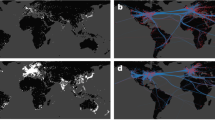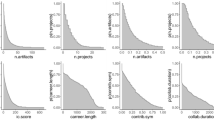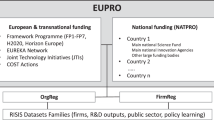Abstract
The Wikimedia project, including Wikipedia, is one of the largest communal data sets and has served as a representative medium to convey collective knowledge in the twenty-first century. Researchers have believed that the analysis of these collaborative digital data sets provides a unique window into the processes of collaborative knowledge formation; yet, in reality, most previous studies have usually focused on its narrow subsets. Here, by analysing all 863 Wikimedia projects (various types and in different languages), we find evidence for a universal growth pattern in communal data formation. We observe that inequality arises early in the development of Wikimedia projects and stabilizes at high levels. To understand the mechanism behind the observed structural inequality, we develop an agent-based model that considers the characteristics of the editors and successfully reproduces the empirical results. Our findings from the Wikimedia projects data, along with other types of collaboration data, such as patents and academic papers, show that a small number of editors have a disproportionately large influence on the formation of collective knowledge. This analysis offers insights into how various collaboration environments can be sustained in the future.
This is a preview of subscription content, access via your institution
Access options
Access Nature and 54 other Nature Portfolio journals
Get Nature+, our best-value online-access subscription
$29.99 / 30 days
cancel any time
Subscribe to this journal
Receive 12 digital issues and online access to articles
$119.00 per year
only $9.92 per issue
Buy this article
- Purchase on Springer Link
- Instant access to full article PDF
Prices may be subject to local taxes which are calculated during checkout




Similar content being viewed by others
Data availability
Wikimedia dumps for the main analysis are available from the Wikimedia Downloads (https://dumps.wikimedia.org/). Additional public data sets are also available from the following sources: OECD (https://data.oecd.org/); UNESCO (http://data.uis.unesco.org/); and the CIA (https://www.cia.gov/library/publications/the-world-factbook/).The data set of the total number of speakers for each language is owned by SIL International and can be accessed from their website by means of a subscription (https://www.ethnologue.com/). Bibliographic metadata of academic papers and patents were retrieved from the in-house system of the Korea Institute of Science and Technology Information and were licensed from Scopus (https://www.scopus.com/) and the European Patent Office (https://www.epo.org/searching-for-patents/business/patstat.html); distribution is prohibited. The pre-processed data used to create the figures are available from GitHub (https://github.com/bluekura/wikimedia-inequality), along with codes.
References
Bruns, A. Blogs, Wikipedia, Second Life, and Beyond: From Production to Produsage (Peter Lang, New York, 2008).
Lemke, C. & Coughlin, E. The change agents. Educ. Leadersh. 67, 54–59 (2009).
Walker, L. Spreading knowledge, the wiki way. Washington Post (9 September 2004); http://www.washingtonpost.com/wp-dyn/articles/A5430-2004Sep8.html
Seelye, K. Q. Snared in the web of a Wikipedia liar. The New York Times (4 December 2005); https://www.nytimes.com/2005/12/04/weekinreview/snared-in-the-web-of-a-wikipedia-liar.html
Chesney, T. An empirical examination of Wikipedia’s credibility. First Monday 11, https://doi.org/10.5210/fm.v11i11.1413 (2006).
Giles, J. Internet encyclopaedias go head to head. Nature 438, 900–901 (2005).
Gandica, Y., Carvalho, J. & Sampaio dos Aidos, F. Wikipedia editing dynamics. Phys. Rev. E 91, 012824 (2015).
Yun, J., Lee, S. H. & Jeong, H. Intellectual interchanges in the history of the massive online open-editing encyclopedia, Wikipedia. Phys. Rev. E 93, 012307 (2016).
Heaberlin, B. & DeDeo, S. The evolution of Wikipedia’s norm network. Future Internet 8, 14 (2016).
Zha, Y., Zhoua, T. & Zhou, C. Unfolding large-scale online collaborative human dynamics. Proc. Natl Acad. Sci. USA 113, 14627–14632 (2016).
Ortega, F., Gonzalez-Barahona, J. M. & Robles, G. On the inequality of contributions to Wikipedia. In Proc. 41st Annual Hawaii International Conference on System Sciences (IEEE, 2008).
Kittur, A., Suh, B. & Chi E. H. Can you ever trust a wiki? Impacting perceived trustworthiness in Wikipedia. In Proc. 2008 ACM Conference on Computer Supported Cooperative Work 477–480 (ACM, 2016).
Adler, B. T. et al. Assigning trust to Wikipedia content. In Proc. 4th International Symposium on Wikis 26 (ACM, 2008).
Yasseri, T., Sumi, R., Rung, A., Kornai, A. & Kertész, J. Dynamics of conflicts in Wikipedia. PLoS ONE 7, e38869 (2012).
Barber, W. & Badre, A. Culturability: the merging of culture and usability. In Proc. 4th Conference on Human Factors and the Web http://zing.ncsl.nist.gov/hfweb/att4/proceedings/barber/ (1998).
Marcus, A. & Gould, E. W. Crosscurrents: cultural dimensions and global Web-user interface design. Interactions 7, 32–46 (2000).
Schmid-Isler, S. The language of digital genres: a semiotic investigation of style and iconology on the World Wide Web. In Proc. 33rd Hawaii International Conference on System Sciences https://doi.org/10.1109/HICSS.2000.926695 (IEEE, 2000).
Pfeil, U., Zaphiris, P. & Ang, C. S. Cultural differences in collaborative authoring of Wikipedia. J. Comput. Mediat. Commun. 12, 88–113 (2006).
Kim, S. et al. Understanding editing behaviors in multilingual Wikipedia. PLoS ONE 11, e0155305 (2016).
Blei, D. M. & Jordan, M. I. Variational inference for Dirichlet process mixtures. Bayesian Anal. 1, 121–143 (2006).
van der Maaten, L. J. P. & Hinton, G. E. Visualizing high-dimensional data using t-SNE. J. Mach. Learn. Res. 9, 2579–2605 (2008).
Simons, G. F. & Fennig, C. D. (eds) Summary by language size. In Ethnologue: Languages of the World, Twenty-first Edition Online Version (SIL International, Dallas, 2018); https://www.ethnologue.com/statistics/size
Gini, C. Variabilità e Mutabilità: Contributo allo Studio delle Distribuzioni e delle Relazioni Statistiche (Tipogr. di P. Cuppini, Bologna, 1912).
Mankiw, N. G. Principles of Economics (Dryden, Forth Worth, 1998).
George, B. P. & George, B. P. Past visits and the intention to revisit a destination: place attachment as the mediator and novelty seeking as the moderator. J. Tour. Stud. 15, 37–50 (2004).
Crane, R. & Sornette, D. Robust dynamic classes revealed by measuring the response function of a social system. Proc. Natl Acad. Sci. USA 105, 15649–15653 (2008).
Wu, F. & Huberman, B. A. Novelty and collective attention. Proc. Natl Acad. Sci. USA 104, 17599–17601 (2007).
Karsai, M., Kaski, K., Barabási, A.-L. & Kertész, J. Universal features of correlated bursty behaviour. Sci. Rep. 2, 397 (2012).
Karsai, M., Perra, N. & Vespignani, A. Time varying networks and the weakness of strong ties. Sci. Rep. 4, 4001 (2014).
Jo, H.-H., Perotti, J. I., Kaski, K. & Kertész, J. Correlated bursts and the role of memory range. Phys. Rev. E 92, 022814 (2015).
Gandica, Y. et al. On the origin of burstiness in human behavior: the Wikipedia edits case. Preprint at https://arxiv.org/abs/1601.00864 (2016).
Hube, C. Bias in Wikipedia. In Proc. 26th International Conference on World Wide Web Companion 717–721 (IW3C2, 2017).
Callahan, E. S. & Herring, S. C. Cultural bias in Wikipedia content on famous persons. J. Assoc. Inf. Sci. Technol. 62, 1899–1915 (2011).
Reagle, J. & Rhue, L. Gender bias in Wikipedia and Britannica. Int. J. Commun. 5, 1138–1158 (2011).
Kittur, A. & Kraut, R. E. Harnessing the wisdom of crowds in Wikipedia: quality through coordination. In Proc. 2008 ACM Conference on Computer Supported Cooperative Work 37–46 (ACM, 2008).
Suh, B., Convertino, G., Chi, E. H. & Pirolli, P. The singularity is not near: slowing growth of Wikipedia. In Proc. 5th International Symposium on Wikis and Open Collaboration 8 (ACM, 2009).
Gherardi, M., Mandrà, S., Bassetti, B. & Cosentino Lagomarsino, M. Evidence for soft bounds in Ubuntu package sizes and mammalian body masses. Proc. Natl Acad. Sci. USA 110, 21054–21058 (2013).
Tsay, J., Dabbish, L. & Herbsleb, J. Influence of social and technical factors for evaluating contribution in GitHub. In Proc. 36th International Conference on Software Engineering 356–366 (ACM, 2014).
Padhye, R., Mani, S. & Sinha, V. S. A study of external community contribution to open-source projects on GitHub. In Proc. 11th Working Conference on Mining Software Repositories 332–335 (ACM, 2014).
Benkler, Y. Wealth of Networks: How Social Production Transforms Markets and Freedom (Yale Univ. Press, New Haven, 2006).
Yergeau, F. UTF-8, A Transformation Format of ISO 10646 https://tools.ietf.org/html/rfc3629 (2003).
Acknowledgements
This work received institutional supports from the Korea Institute of Science and Technology Information. The National Research Foundation (NRF) of Korea grant funded by the Korean Government also supported this work through grant nos. NRF-2017R1E1A1A03070975 (J.Y.), NRF-2018R1C1B5083863 (S.H.L.) and NRF-2017R1A2B3006930 (H.J.). The funders had no role in study design, data collection and analysis, decision to publish or preparation of the manuscript.
Author information
Authors and Affiliations
Contributions
All three authors designed the experiment and wrote the manuscript. J.Y. collected and analysed the data.
Corresponding authors
Ethics declarations
Competing interests
The authors declare no competing interests.
Additional information
Publisher’s note: Springer Nature remains neutral with regard to jurisdictional claims in published maps and institutional affiliations.
Supplementary information
Supplementary Information
Supplementary Figs. 1–27, Supplementary Tables 1–7, Supplementary Methods, Supplementary References
Rights and permissions
About this article
Cite this article
Yun, J., Lee, S.H. & Jeong, H. Early onset of structural inequality in the formation of collaborative knowledge in all Wikimedia projects. Nat Hum Behav 3, 155–163 (2019). https://doi.org/10.1038/s41562-018-0488-z
Received:
Accepted:
Published:
Issue Date:
DOI: https://doi.org/10.1038/s41562-018-0488-z
This article is cited by
-
Collective memory shapes the organization of individual memories in the medial prefrontal cortex
Nature Human Behaviour (2019)



